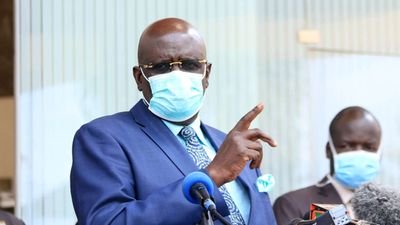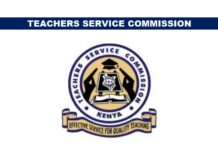
STATEMENT ON THE STATUS OF EDUCATION SECTOR
Having accrued considerable experience in public service in numerous capacities, I strongly believe that for any meaningful, positive and measurable change to happen, things must be done differently.
While I do concede that I am not perfect, in the process of reforms of the magnitude required to improve service delivery in the education sector, I also recognise that this process is bound to generate resistance if tangible results are to be achieved.
My management style which has proved successful over the years is walking about at the point of service delivery.
I will qualify this position by citing a few examples:
1. Chronic Absenteeism from the workplace
When I was sworn in as Cabinet Secretary for Education on March 26, 2019 my first engagement at the Ministry of Education was to physically confirm whether Ministry employees report to work at the expected time.
I immediately realised that more that 60% of the offices were empty and unattended by 11am. I then sought to rally the staff and firmly impressed upon them the importance of reporting for duty on time.
To monitor attendance of staff to their duties, I spearheaded the installation of CCTV and biometric devices in all entry and exit points for checking in and out all Ministry personnel.
Though it was initially resisted, within a span of 6 months, cases of absenteeism had reduced to almost zero with nearly all top managers reporting for duty voluntarily by 6:30am, a situation which has remained the same to date.
2. Chronic Absenteeism by Field Officers
Chronic absenteeism in the field has persisted even though significant improvements have improved tremendously. A small number of field officers limit their work to their offices with little effort to physically monitor implementation of education programmes in the field unless a senior Ministry official from the Headquarters is present.
This is however negated by a substantive number of dedicated field officers whose impact in the field is laudable.
During my numerous field visits, I have been able to identify competent officers such as Mr. Weru Machocho who I promoted and deployed as a Regional Director and he has demonstrated excellent results in a short span of a month especially through visiting more than 200 schools to physically inspect and ensure that Economic Stimulus Programme for desks are fabricated as per prototype specification and delivered to schools promptly.
For a measurable impact to be made, all government employees must work for the pay that they earn monthly.
In my many field visits I have noted that chronic absenteeism is the single leading cause of poor quality assurance and oversight by the Ministry.
On this concern, I wish to confirm that for as long as I remain at the helm of the Ministry, I shall continue to ensure that all Ministry employees deliver services to the public as per their job descriptions.
3. Field Visits
I wish to begin by thanking senior officers from the Head Quarters for their numerous and very effective visits to the field since these have strongly supported service delivery by the Ministry.
During my numerous field visits, I have observed and made public pronouncements many times that I have continuously found our teachers in class teaching diligently and demonstrating that they are hardworking, and committed in their teaching.
However, there are a number of instances when our field officers do not provide the necessary support and superintendence required for effective service delivery.
The rights of learners, teachers, parents and the wider public who are directly and indirectly affected by the education sector must be safeguarded by all public officers in the education sector by being hands-on and diligent.
4. Misappropriation of Public Funds in the Ministry of Education
As public officers, we are duty bound to ensure that Kenyans their hard-earned taxes and other revenues from the public kitty is utilised prudently.
This can only be achieved if we embrace hands-on management of these resources.
This management approach has been instrumental in identifying lapses within the Ministry where Public Funds have been misappropriated and measures to ensure that I effectively intervene have been deployed.
In order to ensure that proper planning and record keeping is maintained the CBC Taskforce undertook an exercise to collect data from all learning institutions and the learners in each institution.
This can now be verified and is fully documented. A key example among others of the significance of the Taskforce’s findings is in the primary school sector where due diligence identified an inflation of numbers of learners from 8.47 million to 9 million learners. The shortfall of 529,997 learners has led to the saving of Kshs. 752,594,740 annually.
5. The Government Stimulus programme for the delivery of desks worth Kshs.1.9 billion
The government allocated Kshs.1.9 billion under the Economic Stimulus Programme for the supply of desks to schools in order to enhance social distancing as a strategy of reducing Covid-19 transmission.
I tasked one of the units in the Ministry to develop and cost a prototype. When I did due diligence of establishing the market prices of the desks, I realised that the Unit at the Ministry had inflated the cost by Ksh 1,700, which means only 250,000 desks would have been supplied. The Ministry set the prices at Ksh 2500 and Ksh 3800 for primary and secondary school desks respectively.
The government will now be able to supply 622,157 locally assembled desks to 5,136 public primary (359,450 desks) and 5,243 public secondary schools (262,707 desks, lockers and chairs).
This programme seeks to ensure that local jua kali artisans and workshops at the sub-county level are supported to uplift thousands of livelihoods and support learners with desks that would mitigate the effects of social distancing in preventing the spread of the COVID-19 pandemic.
The process of fabricating and delivering the desks took off in earnest and when I demanded for a report from Sub- Counties which had delivered desks to schools I was taken aback when I sought to verify the reports by sampling and going to the field in person.
In Kakamega North where the schools identified were five (5), I only found delivery in 2 schools and the desks delivered in those schools were of poor quality, not varnished and did not meet the specifications of the prototype.
The same was exemplified by Mumias East and numerous other sub-counties across the country.
I wish to thank all the field officers who are correcting such anomalies in an effort to fabricate and deliver the quality and standards of desks required as per the prototype.
6. 100% transition
The policy on 100% transition which was implemented from 2018 was only successful this year through mobilisation of all education field officers and co-ordination with the Ministry of Interior and Co-ordination of National Government working as a team to mop up all children who had not reported to Form 1 at the expected time.
The operation was successful because I personally demanded that every education field officer must account for every child who had completed Class 8 and I visited all areas that had reported many cases of children who had not been admitted including those who were pregnant or from disadvantaged families.
In addition, the Ministry of Interior and Co-ordination of National Government through its Cabinet Secretary, Dr. Fred Matiangí ensured that all his field officers were fully engaged.
Conclusion
I thank all officers within the education sector for their diligence and continue to persuade the few who are left behind to join us in delivering for the Kenyan child as a team.
Unless otherwise directed by my appointing authority, I shall continue to perform ALL my duties and responsibilities with zeal and commitment and ensure that ALL officers in the Ministry of Education perform their duties for the benefit of the Kenyan Child, Parents and all education stakeholders.
Prof. George A. O. Magoha, CBS
CABINET SECRETARY
Dated: November 14, 2020











